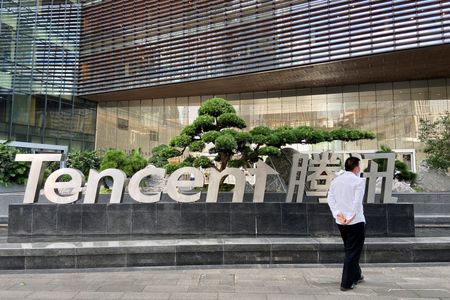By Josh Ye
HONG KONG (Reuters) – China’s Tencent Holdings said on Wednesday it would return capital to shareholders through a dividend distribution of its $20.3 billion stake in food delivery firm Meituan as its sales fell for a second straight quarter.
Meituan said it would maintain its mutually beneficial business relationship with Tencent after the divestment, which comes as the Shenzhen-based tech giant shuts some unprofitable businesses and laying off staff in a bid to return to growth.
The divestment plan, which Reuters reported in August, follows China’s regulatory crackdown on its tech groups, which started in late 2020 and took aim at their sprawling empires, bringing their giddy growth to a grinding halt.
Tencent has been reducing holdings in portfolio companies partly to appease the Chinese regulators and partly to book hefty profits on those bets, sources have said.
James Mitchell, Tencent’s chief strategy officer, told analysts that regulatory restrictions on teenage gamers, the lack of video game licenses and the weak macro economy have been the main factors hindering its gaming revenue growth.
“In order for the revenue growth to notably and sustainably reaccelerate, we would like the benefit from one or the other two (improving),” he said. “We expect more new game licenses for more commercial games to come through relatively quickly.”
The world’s largest video game company and the operator of the WeChat messaging platform, said its revenue fell by 2% to 140 billion yuan ($19.8 billion) for the three months ending Sept. 30. It also missed an average analyst forecast of 141.6 billion yuan.
Up to the previous quarter, Tencent reported double digit growth for almost every three-month reporting period since going public in 2004. It has lost nearly 60% of its market value since a peak in February 2021.
Tencent’s American Depository Receipts jumped nearly 10% in New York at Wednesday’s market open.
SPECIAL DIVIDEND
Mitchell said Tencent’s incentive to distribute its Meituan shares was to return capital to shareholders. He said Meituan’s financial strength, industry positioning and its investment return profile were all reasons for the decision.
“We’ve had very good returns on the investment, around 30% (internal rate of return). And if you look in terms of financial profile, then it is profitable,” he said.
Tencent said it will transfer 958.12 million Meituan shares, representing approximately 15.5% of the total issued. Tencent owns 17% of the company.
“Tencent has already distanced itself from Meituan. Given the anti-trust environment, all investment stakes, even if strategic by intention when the deal was done, are now financial. I guess all major stakes will eventually be distributed or sold,” said 86 Research analyst Charlie Chai.
In December, Tencent announced the divestment of about 86% of its stake in JD.Com Inc, worth $16.4 billion, weakening ties to China’s second-biggest e-commerce platform.
Besides Meituan, Tencent also holds stakes in e-commerce company Pinduoduo Inc, video platform Kuaishou, ride-hailing champion Didi, electric vehicle maker Tesla and streaming service Spotify.
When asked whether Tencent will further shrink its investment portfolio, Mitchell said it does not “necessarily need to do it” because it has $15 billion annual free cash flow, sufficient for its fund investments and product development.
GAMES HIT
Demand for video games, a key revenue source for Tencent, remained weak in the quarter, as it has not received publishing approval for any commercial game for more than a year.
A Tencent subsidiary obtained a licence in September but it was for an educational game with no monetization.
Domestic gaming revenue shrank 7% to 31.2 billion yuan, while international gaming revenue rose 3% to 11.7 billion.
Online advertisement sales fell by more than 5% to 21.5 billion yuan, as advertisers tightened budgets in a weak economy.
Net profit rose 1% to 39.9 billion yuan, ahead of an average estimate by analysts of 25.6 billion yuan.
The number of Tencent employees fell by 1,875 to 108,836 as of end-September. The second quarter’s number was already down by 5,498, or nearly 5% from the first quarter. Reuters reported on Tuesday that Tencent has begun a new round of job cuts targeted at its video streaming, gaming and cloud units. Reuters was not able to establish the scale of the job losses.
REGULATORY EASING
Tencent President Martin Lau said that the company is seeing “positive signals that cross the path of macro and regulatory normalization” as key investment and joint venture licenses are being granted.
Lau pointed to Chinese regulators’ recent approval of Tencent’s plan to form a joint venture with state-owned telecom giant China Unicom in edge computing, describing it as a signal towards easing regarding Beijing’s antitrust scrutiny.
Lau also highlighted the regulatory approval of Tencent’s investment in Samsung Property and Casualty Insurance, calling it another signal towards a better regulatory environment.
Asked about Tencent’s progress on obtaining a financial holding company license, Lau said that it is “interacting very closely with the regulators” and “in the process of understanding the requirements.”
Overall, Lau said reports from the recent Party Congress and the National Development and Reform Commission have recognised the achievements of the digital economy, which should signal a more supportive environment for tech companies.
(Reporting by Josh Ye and Miyoung Kim; Editing by Robert Birsel and Alexander Smith)

